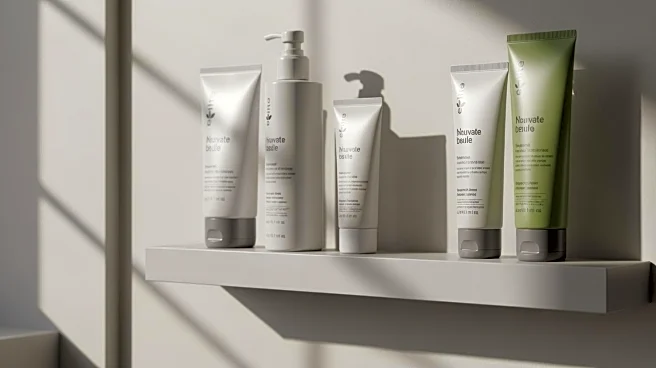What's Happening?
Procter & Gamble (P&G) has launched a new brand, Gemz, marking its entry into the waterless hair care market. This innovation represents a significant shift from traditional liquid-based products to concentrated,
water-activated formats. The Gemz line includes dissolvable hexagonal tiles that activate upon contact with water, offering a personalized and performance-driven hair care experience. This development is part of a broader trend towards sustainable beauty practices, emphasizing reduced water usage and minimal packaging. The waterless products are designed to be travel-friendly and cater to consumers' growing demand for eco-efficient solutions without compromising on quality or convenience.
Why It's Important?
The introduction of waterless hair care by a major player like P&G underscores a transformative moment in the beauty industry. As sustainability becomes a critical concern, the shift towards waterless products addresses both environmental and consumer needs. This innovation reduces water consumption and packaging waste, aligning with global sustainability goals. For consumers, it offers a blend of luxury and responsibility, appealing to those who prioritize eco-friendly products without sacrificing performance. The move also sets a precedent for other beauty brands to innovate and adapt to changing consumer preferences, potentially reshaping industry standards.
What's Next?
With P&G's entry into the waterless market, other major beauty brands may follow suit, leading to increased competition and innovation in sustainable product offerings. Retailers are likely to allocate more shelf space to compact and refillable systems, reflecting the growing consumer demand for environmentally conscious products. In the long term, the beauty industry may see a widespread transition to near-waterless supply chains, making sustainability an integral part of product development rather than a niche innovation. This could also spur advancements in related sectors, such as packaging and logistics, to support the new product formats.
Beyond the Headlines
The shift towards waterless beauty products highlights a cultural change in consumer behavior, where sustainability and convenience are no longer mutually exclusive. This trend may influence other industries to adopt similar practices, promoting a broader cultural shift towards minimal impact living. Additionally, the focus on science-driven innovation in beauty products could lead to further exploration of material science and biomimicry, enhancing product functionality and consumer experience. As consumers become more eco-literate, brands will need to demonstrate genuine sustainability efforts, moving beyond greenwashing to deliver tangible environmental benefits.









